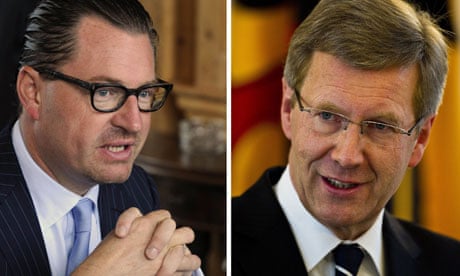Germany's president, Christian Wulff, is facing growing pressure to stand down following damaging revelations that he tried to browbeat the editor of the country's top tabloid to kill an unflattering story about him.
Germany's press were united in their condemnation of Wulff after it emerged on Monday that he had threatened the editor of Bild, Kai Diekmann.
In a furious voicemail message, Wulff told Diekmann there would be "war" unless he spiked an article on the president's personal finances.
Wulff, a key ally of Angela Merkel, the chancellor, and a Christian Democrat like her, accepted a large private loan from the wife of a wealthy businessman.
Although the arrangement was made before Wulff became president in 2010, it has fuelled claims that he lacks the personal judgment needed for the job.
In December Bild discovered that Wulff had taken a €500,000 (£420,000) loan from the wife of a close friend, Egon Geerkens, at an interest rate of 4% – 1% below the usual bank rate.
After discovering Bild was about to publish, Wulff tried unsuccessfully to reach Diekmann, who was away on a trip. He then left him a long, haranguing message, threatening "judicial consequences" and a "definitive breach" in relations with Bild's publishing group, Axel Springer. Two days later Wulff phoned back from a tour in the Gulf to apologise. Wulff, who took over the largely ceremonial role in June 2010, faced further embarrassing questions about his behaviour when another Springer newspaper, the Welt am Sonntag, revealed he had summoned one of its veteran reporters to a dressing down at his presidential residence. Wulff had taken umbrage at a forthcoming interview with his little-known half-sister.
The influential FT Deutschland newspaper called on Wulff to resign. The Süddeutsche newspaper described his dealings with the media as "naive and brazen", observing coldly: "The office is obviously too big for Wulff."
Die Welt, another Springer title, said Wulff had failed to fill the boots of illustrious 20th century predecessors such as Theodor Heuss and Richard von Weizsäcker.
Constanze Stelzenmüller, a senior transatlantic fellow with the German Marshall Fund, said it was unclear whether the scandal would eventually force a wounded Wulff out. But she told the Guardian: "It's looking pretty bad."
She added: "Lots of the behaviour he stands accused of is borderline. None of it is prosecutable. But it's hugely embarrassing, not just for him but for the governing coalition. The telephone calls to the media have entirely diminished his stature."
Conservative allies also appeared to be deserting him.
Holger Zastrow, deputy chairman of the pro-business Free Democratic party (FDP), which is a junior partner in Merkel's coalition, said Wulff had a "duty to explain himself".
He told broadcaster MDR: "If a German president personally picks up the phone to ring an editor and leaves a mailbox message, this is not what I expect of a president."
Other senior conservatives said they expected Wulff, whose next public appearance is scheduled for Friday, to explain himself.
Thomas Oppermann, a senior opposition Social Democrat, said time had run out for Wulff.
"The grace period is over," he said.
"No German president is above the law. That applies to press freedom, too. It is absolutely inappropriate if the president is trying to stop free reporting."
Wulff is a leading member of Merkel's centre-right Christian Democrat party. Up until now, his tenure in the job had been unobjectionable, observers say.
He had made a well-regarded speech on the integration of Muslim immigrants and has been wisely cautious not to offend Merkel, Germany's foremost politician.
Critics have pointed to his silence about the eurozone crisis – an area in which he apparently lacks expertise or confidence, unlike Germany's previous president, Horst Köhler, an economist.
He has also been accused of hypocrisy after he made several speeches stressing the importance of press freedom.
Wulff apologised late last month for the home loan he received in 2008 when he was minister-president in the state of Lower Saxony.
In February 2010, facing awkward questions about Geerkens, he swapped the private loan for a bank mortgage. News of the loan broke on 13 December but Wulff's dubious personal interventions only became known this week.
